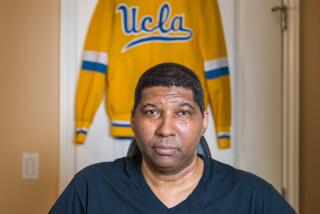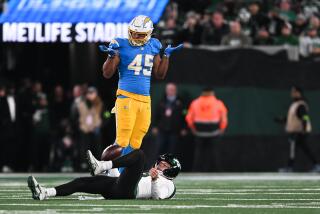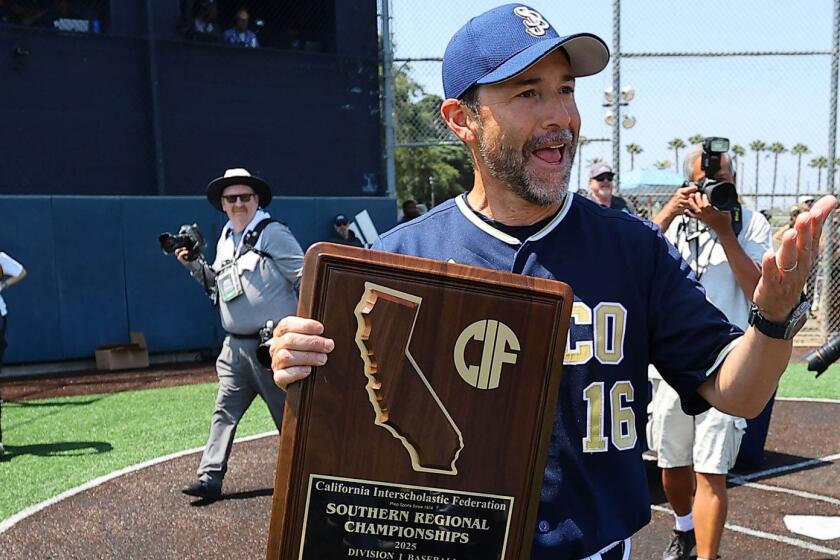A Quarterback Scores Big
- Share via
Lou Budde had to master a set of basic skills before he could play quarterback for Miraleste High School’s football team.
Running the option and reading defenses would come later.
First, Budde had to relearn how to walk, read and carry on a conversation.
His ability to perform those simple functions was impaired by Severe Closed Head Injury. Budde suffered brain damage in a 1985 auto accident in which he was pinned inside a pickup truck after it flipped over on a winding stretch of Palos Verdes Drive East near the Miraleste campus.
Budde, a passenger in the truck driven by a teammate, doesn’t recall many details of that night. What he does remember is the love, strength and support provided by family and friends during rehabilitation. He particularly remembers the motivation from his father, Don.
“My dad would push me,” he said. “He would set goals for me to strive for. When I came home in a wheelchair, he would try to make me walk. Instead of crawling to the television, he would make me walk.”
Those who know Budde say the Miraleste senior deserves much of the credit for his recovery. Last season, less than a year after the accident, he was playing varsity quarterback.
“It’s one of the best recoveries we’ve seen from that type of injury,” said Dr. Maureen McMorrow, director of the Pediatric Head Injury Program at Rancho Los Amigos Hospital in Downey, where Budde underwent therapy.
“You could tell that he had a lot of inner strength. If we could have them all turn out like him, our job would be a lot easier.”
Said former Miraleste football Coach Gary Kimbrell: “It’s like I told our team after spring practice, ‘Hey, if we had a team of Lou Buddes, we’re CIF champs.’ ”
Budde won’t be involved in a CIF championship this season. Miraleste is 1-7 overall and 1-2 in Pioneer League play heading into Friday’s 2:45 p.m. game against visiting Centennial. The 6-foot-3, 180-pounder has played competently this season, but he is not a standout. His strengths are in less tangible areas.
“He is probably--and I have no idea whether it had anything to do with what happened to him in the past--one of the toughest kids, mentally and physically, that I’ve seen in a long time,” said Miraleste Athletic Director Tom Graves, who replaced Kimbrell as coach this season.
“He has his shortcomings as a quarterback. He’s just an average thrower and has real poor feet. But he’s a leader. The kids look up to him. They know he’s the guy who’s going to take charge out there.”
Budde played on the sophomore team when he entered Troy Jankovich’s pickup truck on the night of Oct. 10, 1985.
Budde, Jankovich and Drake Wesson, football teammates at Miraleste, were on their way home from a team dinner when Budde changed the radio station because he didn’t like the song that was playing.
His teammates protested. Wesson tried to get the song back but had trouble relocating the station. Jankovich, who was driving, reached down to tune the radio, and the truck veered into the curb. In his haste to correct the error, Jankovich said he overcompensated, turned the steering wheel and flipped the jacked-up truck.
Jankovich climbed out of the passenger’s window and helped pull Wesson out the driver’s side. Budde, sitting in the middle, was thrown halfway out the driver’s window, his face scraping the pavement as the truck sat upside down.
“I remember him lying there and blood all over,” Jankovich said. “I was scared. The roof was crushed on top of the seat and the steering wheel. I tried to get Lou out, but he was stuck in there.”
Firemen extracted Budde. At Harbor-UCLA Medical Center he began the fight for his life and his senses. Neither Jankovich nor Wesson was seriously injured.
After being in a coma for nearly a week, Budde’s condition was similar to that of a stroke victim. The right side of his body was paralyzed, he slurred words and had trouble remembering. His right thumb was broken in three places.
Perhaps worst, at least to his mother, he had no facial expression.
“It’s a very discouraging thing to see your loved one, who had a twinkle in his eye, suddenly not have it,” said Nancy Budde. “That’s sad.”
For Kimbrell, the incident brought memories of a personal tragedy. His brother, John, died following a car accident in 1974.
“I remember going to see Lou in the hospital and being just completely depressed,” Kimbrell said. “I almost felt like crying.”
Nancy and Don Budde maintained an around-the-clock vigil in their son’s hospital room. They played tapes of Lou’s friends and favorite music in an effort to stimulate him. Nancy took a leave from her job as a teacher to spend nearly all of her time at the hospital.
“I couldn’t believe how strong his parents were,” Kimbrell said.
During the early stages of Lou’s recovery, Nancy was educated about head injuries. She was told not to expect too much, but the family--Lou is the second-youngest of four brothers--remained optimistic.
“Most people think of brain damage as something permanent, with no hope,” she said. “In Lou’s case, his personality wasn’t affected. His attitude has helped him recover so fast. Plus his youth.”
Meeting him today, Lou seems like any normal 17-year-old. A few minor scars on his handsome face are the only noticeable signs of the accident. He’s articulate, bright and cheerful. He still has learning disabilities, but because of dedicated study habits he has not fallen behind in school.
“When I’m in class, I can’t pick up things as easily as other people,” he said. “I have to study more. I do my homework every night. When I came back from the accident, I wasn’t all there. Now I get A’s and B’s.
“I’ve thought about playing college football. I will if someone wants me to play.”
Football was the last thing on anyone’s mind when Lou transferred from Harbor-UCLA Medical Center to Rancho Los Amigos Hospital 18 days after the accident to begin therapy.
Dr. McMorrow said when Lou arrived at the Downey facility he was suffering from serious cognitive deficiencies. His perception, memory and judgment were stunted, as well as his ability to walk. He got around in a wheelchair.
“He had trouble thinking through problems and understanding the meaning of words,” McMorrow said. “We had to break down his vocabulary to a second- and third-grade level.
“We would read him a paragraph. It was very simple stuff. Then we’d come back a half-hour or 45 minutes later and he wouldn’t even remember he had heard the story. He’d look at you and say, ‘Huh?’ ”
After his first week at Rancho Los Amigos, Lou began going home on weekends. He’d return to the hospital during the week to undergo physical, speech and occupational therapies.
Slowly but surely, Lou regained control of the right side of his body and began walking. His cognitive skills were also improving. Two months after the accident, he left Rancho Los Amigos and prepared to return to school.
“He did tremendously better than one would have guessed from his initial injuries,” McMorrow said. “He progressed several grade levels. Part of it was due to his family’s support.
“He showed great perseverance to work all day in these therapies, which are tiring and challenging. He was remarkable in his devotion to the other children. He gave of himself noticeably beyond that of other children.”
Asked how Lou gets along with his classmates, Jankovich replied: “Everybody loves him.”
That was evident the day Lou returned to school just before the Christmas break. He was greeted by a receptive student body and a banner that read: “Welcome back, Lou.”
“This school was elated,” Graves said. “We couldn’t believe that the kid was here.”
Lou was back in school, but he still wasn’t his old self. He needed a walker and about half of his classes consisted of special education courses. Still, he was set on playing football again.
At the time, it was easy to dismiss talk of football as a pipe dream.
“I could see that he wasn’t physically or mentally ready to do anything,” Kimbrell said. “We assumed he wouldn’t be playing.”
Four months later, in April, Lou was in spring drills. He had strengthened himself through weight lifting and was deemed fit to play football by his doctor and parents.
“There are some people who say after a head injury like that you shouldn’t play contact sports again,” McMorrow said. “But for someone like (Lou), football was his main source of self-esteem. You have to weigh the theoretical risks of another head injury against what it will do to sit him on the bench. It could ultimately impede what rehabilitation had been done. That would be taking a lot away.
“Every time he gets in a car, there’s a risk. You can’t live in a closed cage.”
For Nancy Budde, the decision to allow Lou to play football again was difficult. She worried what her friends would say. She didn’t want to be perceived as a negligent parent. In the end, though, she was sure the correct decision had been made.
“I knew football is what had taken him as far as he had come,” she said. “I couldn’t take that away from him. My brother coached football in Ohio, so I grew up thinking a lot of good comes from football.”
When it came time to confront the issue of playing again, Lou, at his father’s coaxing, took the bold approach. He did not simply ask McMorrow if he could play.
“My dad told me to go over and tell her, ‘When I play football again, what kind of helmet should I where?’ The doctor said it wasn’t up to her anymore, it was up to my parents.”
Lou was standing on the sidelines during Miraleste’s Pioneer League opener last season when starting quarterback Todd Hollingshead went down with a broken hand. Kimbrell laughs when he recalls the startled look on Lou’s face after he summoned him into the game.
Whatever jitters Lou might have experienced weren’t apparent once he got into action. One of the first plays he ran was a bootleg that ended with him face to face with Morningside All-CIF linebacker Corey Brown, who now plays for the University of Washington.
“Lou is not one of those guys who’s going to slide or anything, and Brown just flattened him,” Kimbrell recalled. “I said, ‘Oh God.’ I was worried about him not getting up because it was a good collision.”
Lou bounced up and went back to the huddle. A few plays later, he met Morningside nose tackle Jimmy Porter head-on and they carried Porter, an all-league player, off the field.
Said Kimbrell: “After that I told him, ‘Lou, you have to start running out of bounds and learning how to slide.’ ”
Apparently that’s just not his style of playing quarterback. Graves says Lou is just as aggressive in practice as in a game.
“We continually talk to him about pitching the ball on the option because he doesn’t have great speed,” Graves said. “He turned it up and I mean just flattened one of our linemen who weighs about 220. Lou’s just that way.”
Lou started the rest of Miraleste’s games last season after a 14-0 loss to Morningside, helping the Marauders earn a spot in the Northwestern Conference playoffs and finish with a 6-3-2 record.
He lost the starting quarterback job to junior Mike Booth this season but regained it when Booth was injured. Lou has completed 33 of 68 passes for 356 yards and no touchdowns. He also plays defensive end, the position where his older brother Chad earned all-league honors last year.
Regardless of the wins, losses or statistics, those around Lou know what football has meant to his recovery.
One of the first things he remembers in the hospital was Kimbrell and his teammates giving him an autographed football.
“His goal was to play football again,” Nancy Budde said. “We didn’t really think he’d play again. But we didn’t let him know that.”
Don Budde is a successful businessman. He has his own company, Budde International, a marketing firm for high-technology products.
His wife believes he is a greater success as a father.
“My husband is a miracle worker,” Nancy said. “When Lou would think, ‘I can’t,’ his father would always tell him, ‘Well, you can.’ He set realistic goals for him.”
Don, who was establishing his business during the time of the accident, downplays his role in Lou’s rehabilitation.
“If I was helpful to his recovery, then I’d say he has also been an inspiration to me,” he said. “To see him go out on the field in a football uniform, even in my most optimistic moments, was something I thought I’d never live to see.”
Lou’s recovery, both mentally and physically, was achieved one step at a time. He progressed from a wheelchair to a walker to walking on his own. Don remembers the day Lou began to run again:
“I took him up to the high school and ran with him around the track. He had a tough time, but he did it. I think those small victories motivated him to strive for even bigger things.”
That motivation carried over into schoolwork. Don says it’s not unusual for Lou to spend five hours a night studying.
“I remember sitting with Lou at home one night,” he said. “He was having a difficult time with his studies. He said, ‘Dad, I just have to work harder than other people to get where I want to go--and I’m going to do it.’ It brought tears to my eyes.
“He accepted that he had to work harder than anyone else. He tried hard, and I think he got his just reward. Self-determination pulled him through.”
Don Budde realizes he has a lot to be thankful for. The week he helplessly watched his son lie in a coma is only a painful memory now.
When he looks into Lou’s eyes today, he sees a twinkle.
More to Read
Get our high school sports newsletter
Prep Rally is devoted to the SoCal high school sports experience, bringing you scores, stories and a behind-the-scenes look at what makes prep sports so popular.
You may occasionally receive promotional content from the Los Angeles Times.






